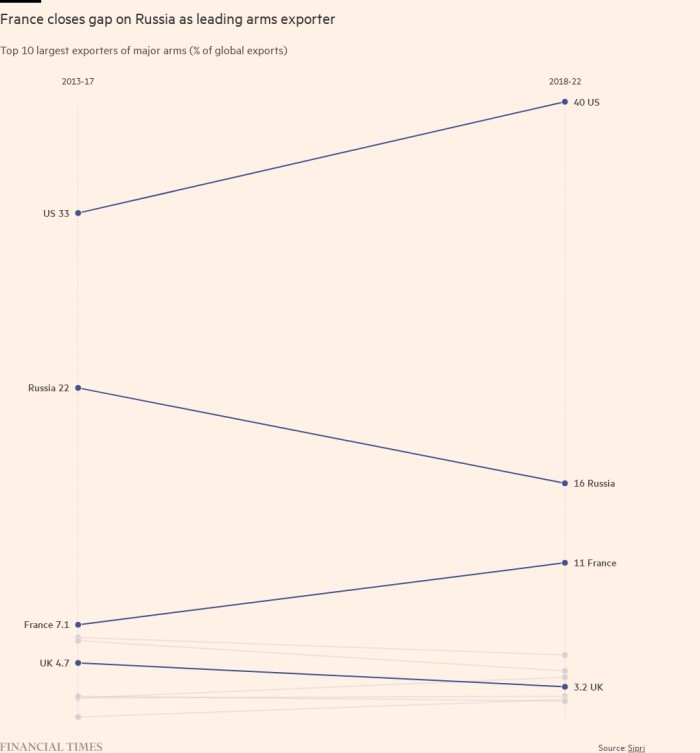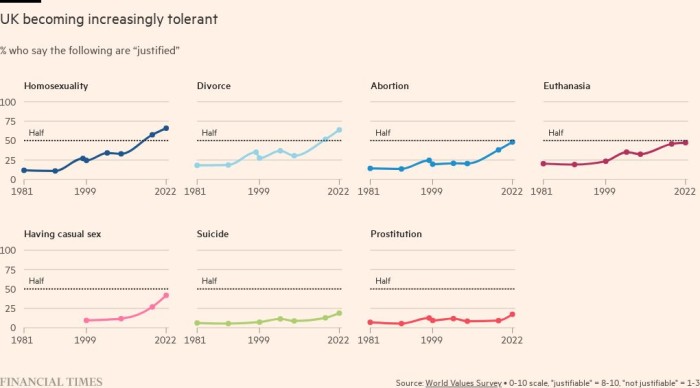[ad_1]
SVB and Signature Bank were the second and third-largest bank failures in US history, with combined assets of $319bn, according to data from the US Federal Deposit Insurance Corporation.
The worst year for US failures, was 2008 when banks with assets of $374bn, went under, triggering the Global Financial Crisis.
The collapse of Lehman Brothers on September 15 was followed a week later by Washington Mutual, the largest bank failure in US history, at $307bn in assets.
Since then 525 US banks have gone under. But after reaching a peak of 157 institutions in 2010, bank failures dropped steadily. 2021 and 2022 saw no closures. Silicon Valley Bank became the first US bank failure in 868 days, the longest period without a bank failure since 2007, when the closure of Metropolitan Savings Bank ended a 952-day run.
Shotaro Tani
Our other charts of the week . . .
France increased its share of worldwide arms exports to more than ten per cent in the period 2018-2022, consolidating third place in global rankings and closing the gap on second-placed Russia from 15 percentage points to five.
India, Qatar and Egypt were the top destinations for France’s exports, collectively accounting for more than half, according to data published by the Stockholm International Peace Research Institute (Sipri).
US exports surged to 40 per cent of the global market, up seven percentage points, while the UK share declined to 3.2 per cent, slipping behind Italy whose exports increased to 3.8 per cent.
European states increased their imports of arms by 47 per cent between 2013-17 and 2018-22, bucking a trend that saw the global volume of arms transactions decline by 5.1 per cent over the same period.
Alan Smith
Some 60,000 to 70,000 Russian soldiers were killed in the first year of its full-scale invasion of Ukraine, according to an estimate from think-tank CSIS, more than the number that died in all of its other wars since 1945 put together.
The combat fatalities are more than four times higher than the decade-long Soviet-Afghan War.
The number includes regular Russian soldiers, fighters from pro-Russian militias and contractors from private military companies such as the Wagner Group.
Despite the cost in lives, Russia’s control of Ukrainian territory has diminished from 30 per cent within a month of launching the invasion, to 17 per cent now, CSIS says.
Shotaro Tani
The UK is becoming more tolerant, according to new data published by King’s College London as part of the seventh World Values Survey. The survey asks respondents to rate a variety of measures from 0 to 10, with 1—3 being considered “not justifiable”, 4—7 as “maybe justifiable” and 8—10 as “justifiable”.
Since the last survey in 2018, the proportion of people who rated homosexuality as “justifiable” has increased from 57 per cent to 66 per cent. For divorce the percentage has risen from 52 to 64.
The proportion of people who say casual sex is justified has increased sharply, rising from 27 per cent in 2018 to 42 per cent in the most recent survey.
Support for abortion and euthanasia nears the majority mark for the first time, according to the survey, which is conducted on average every five years.
Ændra Rininsland
Research using a variety of methods suggests that almost 40 per cent of deaths globally are not registered, due to disparities in national registration systems. Most unregistered deaths occur in low income countries.
Only 8 per cent of deaths that are reported in these countries record the cause of death, compared with 95 per cent in high income countries.
High quality cause-of-death data is important for prioritising public health decisions and investments, as well as monitoring progress.
According to the WHO, there are few perceived incentives in many countries for people to register a death, especially among the poorest: there may be little to inherit following the death of a loved one and understanding of the importance of a death certificate for accessing eligible benefits remains limited. Additionally, not all countries require a legal process to be followed to dispose of a body.
The world is better at recording births. Most countries have some form of registration system — but the births of 36 million babies around the world each year go unregistered.
Alan Smith
Welcome to Datawatch — regular readers of the print edition of the Financial Times might recognise it from its weekday home on the front page.
Do you have thoughts on any of the charts featured this week — or any other data that has caught your eye in the past seven days? Let us know in the comments.
Keep up to date with the latest visual and data journalism from the Financial Times:
-
Data Points. The weekly column from the FT’s chief data reporter John Burn-Murdoch.
-
Climate Graphic of the Week is published every week on our Climate Capital hub page.
-
Sign up to The Climate Graphic: Explained newsletter, free for FT subscribers. Sent out every Sunday, a behind the scenes look at the most topical climate data of the week from our specialist climate reporting and data visualisation team.
-
Follow the Financial Times on Instagram for charts and visuals from significant stories.
-
Follow FT Data on Twitter for news graphics and data-driven stories from across the FT.
[ad_2]
Source link






